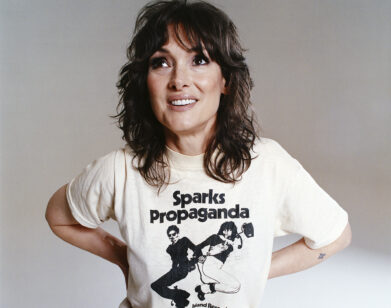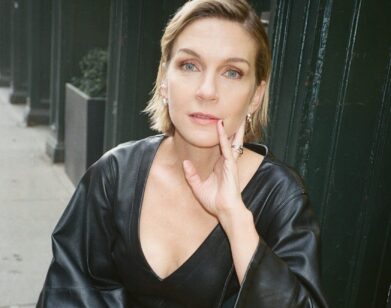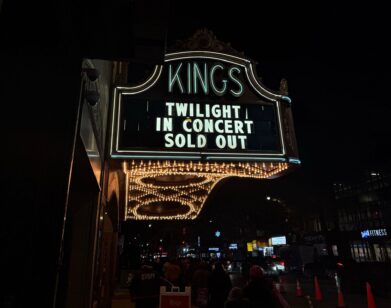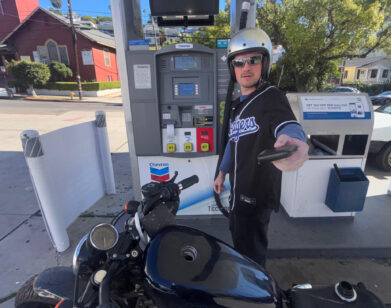Michael Polish and Kate Bosworth, Director and Muse
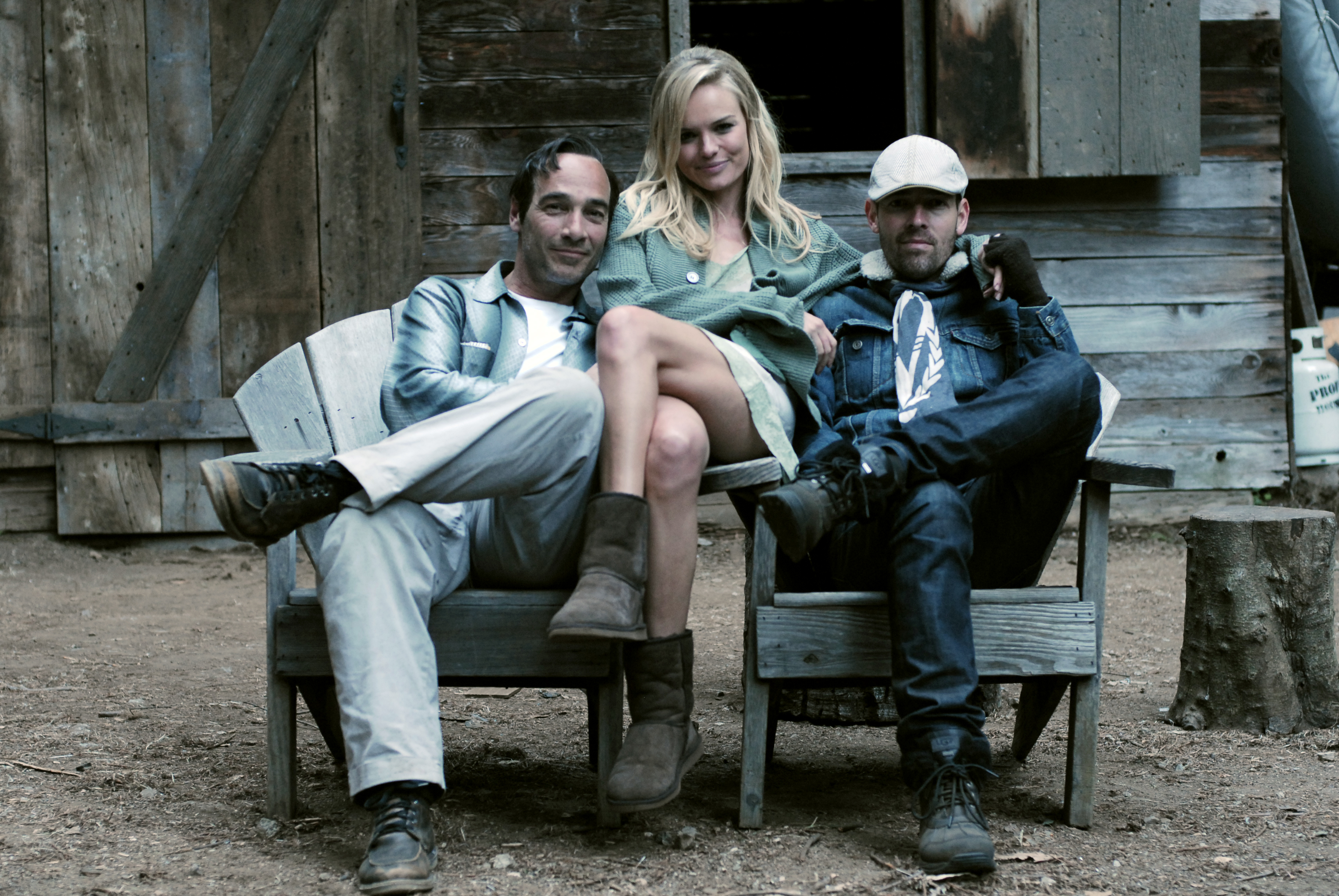
ABOVE: (LEFT TO RIGHT) JEAN-MARC BARR, KATE BOSWORTH, MICHAEL POLISH ON THE SET OF BIG SUR. PHOTO COURTESY OF KETCHUP ENTERTAINMENT
Jack Kerouac the young, handsome, rebellious intellectual high on Benzedrine is an appealing image. Jack Kerouac the middle-aged, misanthropic, alcoholic john is not. It’s a discrepancy of which Kerouac himself was well aware. In the first chapter of his last novel, the autobiographical Big Sur, the writer laments that: “All over America high school and college kids thinking ‘Jack Duluoz is 26 years old and on the road all the time hitch hiking’ while there I am almost 40 years old, bored and jaded.”
This cognitive dissonance and the demise of Kerouac are at the center of Michael Polish’s film. “It’s a meditation,” explains Kate Bosworth, Michael Polish’s new wife, who plays Neil Cassady’s mistress “Billie” (Jackie Gibson Mercer) in the movie. “Michael was very set on adapting the book—not making a movie about the book.”
Polish fulfilled his intentions. Dialogue is often replaced with frantic voiceovers of passages from the book, read frantically Jean-Marc Barr, the actor who plays Kerouac. Joining the Bosworth and Barr are Josh Lucas as Neil Cassady, Radha Mitchell as Carolyn Cassday, Balthazar Getty as Michael McClure, and Anthony Edwards as the relatively tame Lawrence Ferlinghetti.
The film, which premiered at Sundance, is coming out in limited release tomorrow. We spoke with Bosworth and Polish in New York.
EMMA BROWN: What made you choose Big Sur?
MICHAEL POLISH: The Kerouac Estate was looking for directors to do a couple of his books and they sent me Dharma Bums first and I wasn’t too keen on it. I didn’t like the title really, I like the book, just didn’t like the title, but Big Sur was something I was very familiar with because it was his last novel. [With] the end of his life, you could tell everything about him. You could tell the beginning, you could hear about On The Road. It was a capsule of the Jack Kerouac living in life. To me that was the best book.
BROWN: Would they have let you change the title from Dharma Bums?
POLISH: No, I didn’t even ask. I was just joking with them. I had my eye on Big Sur. I saw the catalogue that they were going to produce and I saw Big Sur, and I said, “Would that be available? Would that book be available?” and they sent it to me the next day after I met with Orian Williams. I said that’s the one I want to do.
BROWN: Carolyn Cassady, especially, spoke out about how everyone thought that the Beat generation was so glamorous and really they were just these miserable men. Why do you think it’s so hard to think of them in that way?
POLISH: Because there’s no record of them being assholes. There really isn’t. There’s only a retelling, and I think everything is retold in a way that is romantic. There are great pictures of them in t-shirts and jeans, and you look at them and you go, “They must have been cool.” You look at the ’50s and you don’t think of a lot of things as being bad or harsh. I think it’s a reflection. You hear stories of him being a ruthless drunk in some parts of his career, but I think people want to focus on the writing.
BROWN: Do you think it’s important to tell the other side?
POLISH: I think Big Sur shows you the demon—the demons of these guys. Carolyn was there, you could see it with Billie, Kate’s character, you could tell that it wasn’t so pleasant.
BROWN: Lawrence Ferlinghetti is a character in the film. Did you meet him at all?
POLISH: Yeah, he’s a great guy and I met Michael McClure too, which is Balthazar Getty’s character in it. [I met Lawrence] at his bookstore. Early on—way early on. It was kind of intimidating because you didn’t know what he thought of the books. These guys were way younger than he was. He was publishing their stuff and so he had a fatherly quality I think over the Beat generation.
KATE BOSWORTH: I think Tony portrayed that really well in the movie. You really took that side of—
POLISH: Responsibility.
BOSWORTH: Yeah and also, it’s going back to what you said. He always felt a little bit let down by them. Like a father would.
POLISH: He was disappointed.
BOSWORTH: Yeah, I think he was, even though these were brilliant writers. I think there was something that was consistently disappointing to him and I think you see that in the film, in a subtle, sweet way.
POLISH: I think silence with these guys, speaks a lot.
BROWN: Is it weird to film something for six weeks and then be living with it and doing press for a over a year?
BOSWORTH: As a filmmaker, [Michael] had a vision every step of the way. It requires a certain amount of digestion in terms of every layer that Michael put in. It’s different from a literal, A, B, C, D movie, because Kerouac wasn’t like that. There’s not a specific plot point like a normal story would have. That did require time and patience, and I think that’s a really high attribute from Michael as a filmmaker because it’s easy to be impatient: “I just want to put it out. All of these others Kerouac movies are coming out and what does that mean?” It’s easy to become impatient and yet I feel that this film will be successful because of its patience. That it wasn’t in the muddle of things and it came out last, very much like the last book. I think it is the film I think most Kerouac fans will connect to the most because it is so true to his words.
BROWN: How do you stay patient?
BOSWORTH: I ask him that every day.
POLISH: I teach patience in our house. There was a point where it got really impatient. It gets finished, and you don’t know where you are going to go with it. You find out when it turns out as well as we all think it turned out, that that was required. That six months of finding that even flow, showing it to people, us watching a couple of different cuts, Jean-Marc watching it, and the reaction was really great to watch come back because people hadn’t seen a movie like this. Everything is pure Kerouac. Everything is from that book.
BROWN: Did you change the film from Sundance?
POLISH: I added more time. We added probably eight to 12 minutes.
BROWN: That’s funny. I’m sure you are one of the only filmmakers who added time.
POLISH: We added! Which was incredible, and when we showed it again they said, “We want to see more.” It’s good to leave people wanting more. I was briefly talking to Kate’s dad about it: “You always want to leave them more, Michael. That’s what you want to do.”
BOSWORTH: There was a delicate balance with this one, because it is such a specific journey that you are asking the audience to embark on with you, and it’s so hypnotic.
BROWN: Did you two know each other before you made this movie together?
POLISH: We met once before, we met in the interview process.
BOSWORTH: He asked to meet me for the movie.
POLISH: That was when we met. That was in preproduction, that was in San Francisco. I wanted to work with Kate Bosworth. When I started to adapt the screenplay, I needed somebody that was very smart about this being a very pivotal role. People read this script and thought that she was like the raven—she was the one that destroyed the relationship. I thought that she kept it together. I needed somebody to see it the same way I did. So when I met Kate, I said this is my favorite role. Doing a movie by Jack Kerouac, my favorite role was Billie, because I felt it was really strong and when she came in, just the way she attacked it I was like, “That’s perfect.” Until Kate Bosworth says no, let’s not go anywhere else. That was basically my order. There’s a really intelligent person not just as an actor, but in life for me. I needed somebody to be in front of the camera that could navigate these two guys. It’s tough because Josh was very focused on being Neal, Marc was very focused on being Jack, and I didn’t have an ally. So she became my ally in between this.
BROWN: I don’t generally think of the women in the Beat generation, but I suppose they must’ve been strong characters to stand being around those men.
BOSWORTH: Yeah. I thought Radha played Carolyn Cassady so beautifully, because there’s that stoic nature that she must have had and also a gentleness to her. They needed almost a motherly figure, in a way, through Carolyn. I read a lot about the women of the Beat generation and they were titled “the sober observers” of the madness that ensued. They would have an interesting perspective on the whole Beat generation.
BROWN: How do you go from being the director—the boss—to a friend or a date without it being awkward?
POLISH: We had negotiations about this. I have done 10 movies and I’ve never crossed the line. I was always their leader—I think of myself as more of a coach and this is my team—so it was confronting. Particularly in San Francisco, because I had fallen in love with something I had never fallen in love with before. It was very easy for me to be professional. It was very easy because I’ve done it for so long I could turn it off, but it was impossible with this one.
BOSWORTH: He’s a real lone wolf on every film—I think anyone who works with him will agree. Even as a friend, he doesn’t engage so much with his crew. You have so much to do that it’s not pal time. You’re in your world, you think about the next day. But the way that he and I started working was so different and kind of magical and exciting. It was really this sort of connection of director-actress in the most historic way, like Cassavetes. There wasn’t so much that needed to be said; we let the work start speaking for itself.
POLISH: I love what we do so much, so it was great to find somebody who loved it also. I think it was a real mutual respect. There was never any conflict. There never has been conflict.
BOSWORTH: We inspired each other: I wasn’t doing what he does and he doesn’t do what I do, so there was this great harmony that was created.
POLISH: I wasn’t finding it in other relationships that I had in the past. All my relationships up until this point didn’t work because they didn’t have what she was doing or what she was giving me. So that was an instant turn to have a person—I wouldn’t say a friend, but a professional that started to give me things I didn’t have.
BOSWORTH: It’s hard. The artist-muse relationship is romantic and passionate, and complex, and I would imagine that would be a hard relationship to have if you’re not with the person. It requires so much of each other, you have to be in love with each other. On every level. You have to love them on a level that’s pretty intense. I can imagine that being a bit destructive if you weren’t able to be with that person.
BROWN: Do you ever fall into a post-release slump after a film comes out? I imagine it must be a bit anti-climatic.
POLISH: We’ve done two movies since then. I’ve directed two and we’ve done one together. We’ve done a dozen commercials, so we work a quite a bit together. This is the only movie I feel like there isn’t a big drop-off afterwards. I kind of feel like it keeps going.
BOSWORTH: It’s probably because our journeys together keep going. If we weren’t together, I would have a real problem. [laughs]
POLISH: [laughs] It’d be very difficult to do press if we weren’t together. Oh my God, what a disaster.
BROWN: Did you ever consider that? “Maybe we shouldn’t date, because if we break up by the time we do press…”
POLISH: That didn’t come to mind. When we worked on the movie, I said, “If I don’t get this girl, I’m going to have to leave the United States for life.” It’s true. I knew that if I didn’t get to be in this girl’s life—it was that magnetic—I’d just have to banish myself. I think I would just spin the globe and put my finger down. It’s powerful stuff. I don’t know what she would have done.
BOSWORTH: [laughs] I mean, show me the closest tall story building…
BIG SUR COMES OUT IN LIMITED RELEASE TODAY, NOVEMBER 1.


